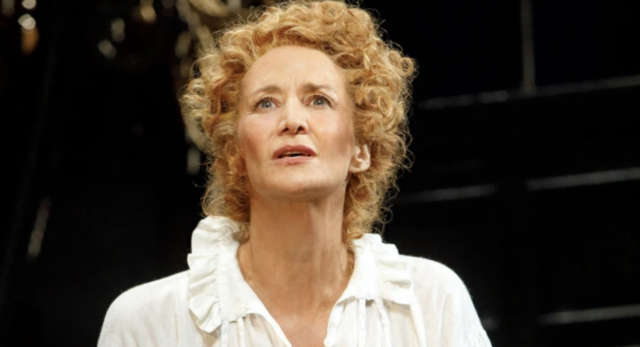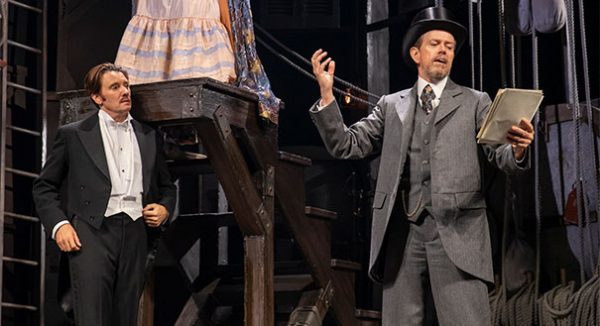
Janet McTeer stars as Sarah Bernhardt in new play by Theresa Rebeck (photo by Joan Marcus)
American Airlines Theatre
227 West 42nd St. between Broadway & Eighth Ave.
Tuesday – Sunday through November 18, $59-$159
212-719-1300
www.roundabouttheatre.org
When turn-of-the-twentieth-century theater superstar Sarah Bernhardt played the Melancholy Dane in Hamlet at the Adelphi in London, actress and writer Elizabeth Robins wrote in her December 1900 review: “Madame Bernhardt’s assumption of masculinity is so cleverly carried out that one loses sight of Hamlet in one’s admiration for the tour de force of the actress. This is not to say that she gives us a man, but rather Sarah Bernhardt playing, with amazing skill, a spirited boy; doing it with an impetuosity, a youthfulness, almost childish.” Much the same can be said of Tony-winning actress Janet McTeer, who plays Bernhardt playing Hamlet in Theresa Rebeck’s uneven though often exciting Bernhardt/Hamlet, a celebration not only of Bernhardt but of the collaborative process of theater. The Roundabout production, continuing at the American Airlines Theatre through November 18, is set in 1897 Paris, where Bernhardt has decided to play the male part and is rehearsing with Constant Coquelin (Dylan Baker), François (Triney Sandoval), Raoul (Aaron Costa Ganis), and Lysette (Brittany Bradford). Bernhardt’s lover, the married Edmond Rostand (Jason Butler Harner), is not fond of her decision. “You want to be a man,” he tells her. “I do not want to be a man,” she replies. “You crave a man’s power,” he accuses her. “No man has more power than I do,” she says. “Shakespeare does,” he retorts. But she has the last word, proclaiming, “I will not go back to playing flowers for you fools. Not because I am too old. But because I was never a flower, and no matter how much you loved how beautifully I might play the ingenue, it was always beneath me. It is beneath all women.”

Edmond Rostand (Jason Butler Harner) watches Constant Coquelin (Dylan Baker) perform in Bernhardt/Hamlet at the American Airlines Theatre (photo by Joan Marcus)
Bernhardt demands that Rostand rewrite Hamlet specifically for her, but soon he is working on another play, Cyrano de Bergerac, which also gets her juices flowing. The same cannot be said for Rostand’s rightly jealous wife, Rosamond (Ito Aghayere); Bernhardt’s teenage son, Maurice (Nick Westrate); and acerbic critic Louis (Tony Carlin), wielding his poisoned pen with undeserved power. Meanwhile, Czech artist Alphonse Mucha (Matthew Saldivar) hovers around, creating the poster for the controversial show; in Shakespeare’s time, men might have played all the parts, but in the late Victorian/Edwardian era, a woman portraying the title character in the Bard’s greatest work is practically theater — and gender — treason. “And now we come to your tragedy,” Edmond says to Sarah, who responds, “I am not a tragic figure.” Edmond explains, “You are Sarah Bernhardt. But Sarah Bernhardt is a woman. And people do not want to see a woman play Hamlet.” To which Sarah argues, “I do not play him as a woman! I play him as myself.”
Directed by Moritz von Stuelpnagel (Present Laughter, Hand to God), Bernhardt/Hamlet works best when it sticks to its title, when McTeer plays Sarah Bernhardt playing Hamlet. A lot of the rest is detritus that only gets in the way. McTeer (Mary Stuart, God of Carnage) is a joy to watch as her character, complete with crazy hairstyle, questions Hamlet’s motives as well as Shakespeare’s, romping around Beowulf Borrit’s handsome sets, which include an outdoor Paris café, the Adelphi stage, and Bernhardt’s elegant dressing room. Rebeck’s (Seminar, Downstairs) plot meanders; it feels like she tries to squeeze too much in and doesn’t trust that the audience will get the shock factor of Bernhardt’s ambition, especially in this modern era in which so much casting is gender (and race) blind. For example, in 2016, McTeer starred as Petruchio in Phyllida Lloyd’s all-female adaptation of The Taming of the Shrew at the Delacorte. But then McTeer proclaims, “Oh what a rogue and peasant slave am I! / Is it not monstrous that this player here, / But in a fiction, in a dream of passion, / Could force his soul,” and all is right again.